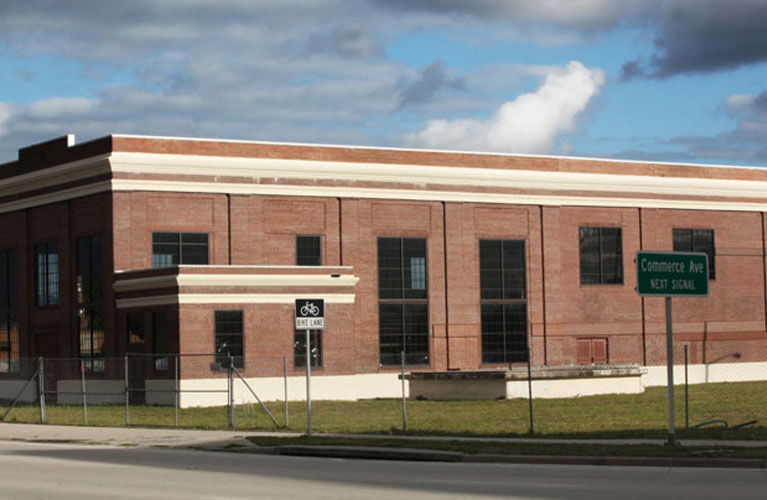
The Vero Beach City Council has voted unanimously to begin negotiations with developer Michael Rechter on the sale of the historic diesel plant downtown, but not before a last-minute pull-out by a competitor threatened to topple the whole carefully structured, state-regulated bidding process.
Judging by the faces of city officials, it was like tugging at a single brick in the 90-year-old plant’s towering walls when at last week’s City Council meeting an increasingly emotional Ross Power pleaded with the council to delay its decision. Then, suddenly, he offered to withdraw his bid.
Litigation over the bid process, or RFP (request for proposals), was the last thing they needed, since the city is already deep into a pernicious lawsuit over a lease on the plant. “We’ve got more attorneys involved in that than anything else,” City Manager Jim O’Connor pointed out.
Power’s idea had been ranked last by a city-appointed review committee, largely because it required financing. That is potentially a problem in the face of newly re-surfaced environmental contamination.
Rechter’s proposal ranked first. He says his $2.5 million commercial craft brewery is fully funded, and will include a restaurant and a biergarten.
In a last-ditch effort to stay in the running, Power said he would merge his art center idea with the small-batch spirits distillery proposed by the second-ranked bidder, Guy D’Amico.
D’Amico’s was a crucial voice that was missing at the meeting; he was at his job in Fort Lauderdale, having learned only that morning that bidders would be speaking at the meeting. “The city sent out an email the night before, but it went to spam,” he says.
D’Amico offered $660,000 – the high bid – to turn the plant into Treasure Coast Distilleries. Like Rechter, he’d made a cash offer. Unlike Rechter, he was not willing to take on the remaining environmental cleanup of the plant which only recently resurfaced, though he offered to put $150,000 of that sum in escrow to pay for the cleanup, letting the city have whatever remained.
Asked by the committee what would happen if the cleanup ran higher than $150,000, D’Amico told officials, “Then we’d have to talk.”
Rechter had offered two sums: $500,000 to do the clean-up himself; $650,000 to let the city do the clean-up. The city has estimated that cost at $30,000, but pending test results could change that.
Either way, Rechter’s stature as a developer and the professionalism of his presentation seemed to fit the city’s criteria of both deep pockets and sustainability.
“It’s a mistake,” pleaded Power. “This is a huge mistake, taking that historical landmark and turning it into a glorified sports bar.”
He said Rechter’s American Icon Brewery, with its theme of naming beers after legendary figures, is “like a theme park. That belongs in Orlando, not as the cornerstone of the new burgeoning art village.”
What charged the meeting most was Power’s strong and vocal backing of the Cultural Council, whose persistent lobbying included going before the review committee as well as the City Council last week. Its leaders had seen their own arts center proposal falter for financial reasons, long before the bidding process began. They say Power’s proposal of private ownership, with its combination of a for-profit gallery and film location, fit in well with the group’s proposed arts village in the area.
Now their dual strategy was to at least delay the city’s vote.
“You’re hard-pressed to delay on this RFP,” warned Turner.
“This is a hard one,” said Councilmember Randy Old. “Your heart goes one way and your pencil goes the other way.”
Finally, Councilmember Harry Howle tried to put an end to the heated back-and-forth pleadings by Rechter and Power, and made a motion to begin negotiations with Rechter. Councilmember Pilar Turner seconded the motion.
Then before a vote could be taken, Mayor Jay Kramer started to vacillate. “There’s a part of me that wants to give it to Treasure Coast with the stipulation that for a week or two, you get your finances in order.”
Kramer turned to Power.
“My impression is you don’t have your finances in order.”
“Treasure Coast does, and I would work through them,” Power replied.
“Then you’re manipulating the bidding process,” Turner cautioned again.
Rechter returned to the lectern. The turn of events left him disappointed, and feeling things had gotten personal. “I thought what Guy proposed was a serious proposal. But at this point in time, for Ross Power to team up with a distillery, when he made all these negative comments about a sports bar?”
That apparently got to Kramer. He reached across the dais toward Rechter.
“I definitely prefer your proposal over theirs, believe me, I do.”
The voice vote, in the end, was unanimous. Now Kramer reached out to Power.
“My apologies, but we have to abide by the RFP. Otherwise our credibility comes into question.”
“As cantankerous as things got, I could see a lawsuit coming,” said Kramer, days after the meeting. “I thought we better stick to the RFP.”
And there is still a chance negotiations with Rechter may fall through. In that case, D’Amico says he’s still interested.



